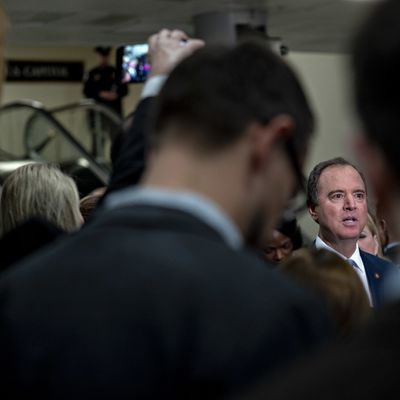
Picking up the pace and sharpening their rhetoric, the House impeachment managers used their third and final day of argument time in the Senate trial of Donald Trump to wrap up their case for presidential abuse of power and then make their case that he obstructed Congress in its pursuit of constitutionally sanctioned impeachment proceedings.
Lead manager and star of the trial (so far) Adam Schiff made the key argument that Trump’s abuse of power was not simply a pattern of bad behavior being judged after the fact, but an “imminent threat” going forward, if unchastened by Congress (per Politico):
President Donald Trump remains an “imminent threat to the integrity of our democracy,” the House’s top impeachment manager Adam Schiff argued Friday in an extraordinary Senate-floor appeal in which he accused Trump of embracing Russian propaganda at the expense of U.S. national security.
“The threat that he will continue to abuse his power and cause grave harm to the nation over the course of the next year … is not hypothetical,” Schiff argued. “Merely exposing the president’s scheme has not stopped him from continuing this destructive pattern of behavior that has brought us to this somber moment. He is who he is.”
On the obstruction of Congress article, the managers spent hours arguing that Trump was unlike any prior president in asserting sweeping immunity from congressional oversight, and claims of executive privilege unmoored from any stated rationale. Representative Zoe Lofgren of California, a House manager who was a congressional staffer during the Watergate saga, compared Trump invidiously to the Tricky One, as the New York Times reports:
Quoting Nixon’s direction to his administration during Watergate, Representative Zoe Lofgren of California, a House manager, read to senators: “All members of the White House staff will appear voluntarily when requested by the committee, they will testify under oath, and they will answer fully all proper questions …”
“In the letter to the speaker of the House, the White House counsel said that President Trump, quote, cannot permit his administration to participate,” Ms. Lofgren said. “No president has ever used the official power of his office to prevent witnesses from giving testimony to Congress in such a blanket and indiscriminate manner.”
Responding to Republican claims that the president’s diffuse claims of executive privilege had to be litigated at length in the courts, Adam Schiff had a fascinating suggestion today even before the resumption of the trial that may have nearly given Chief Justice John Roberts a coronary (as reported by the Washington Post):
Calling executive privilege “the last refuge of the president’s team to conceal the evidence from the American people,” Schiff argued that Roberts, who is presiding over the trial, should “decide issues of evidence and privilege” whenever witnesses or the president claim it, but that the assumption Trump will try to silence certain witnesses by claiming executive privilege should not keep the Senate from calling them to testify.
“The Senate will always have the opportunity to overrule the justice,” Schiff said to reporters, adding that “you cannot use executive privilege to hide wrongdoing or criminality or impeachable misconduct, and that is exactly the purpose for which they seek to use it.”
Manager Jason Crow highlighted Trump’s plethora of legal claims that add up to blanket immunity against accountability, as the Times reported:
Mr. Trump, he said, is a continuing threat in three ways. He accused Mr. Trump of continuing to assert that he is immune from investigation. He said the president’s conduct with regard to Ukraine was part of a “pattern of soliciting foreign interference” that would continue. And he said Mr. Trump’s obstruction of Congress was “a constitutional crime in progress.”
And then Jerrold Nadler underlined the implications:
“He does not have to respect the Congress. He does not have to respect the representatives of the people. Only his will goes. He is a dictator. This must not stand,” Nadler said, arguing that Trump’s efforts to block Congress from conducting legitimate oversight dwarfed that of all his predecessors.
As he has done each evening, Schiff batted clean-up, and summed up the House’s case. Going methodically through the charges against Trump, he concluded each had been proven, and defended his committee’s and his chamber’s proceedings against the anticipated attacks by the president’s attorneys once they get their three days of arguments on Saturday. He predicted that Team Trump would put the House impeachment inquiry, Schiff himself, the whistle-blower, and the Bidens on trial, eschewing any real defense of the president’s conduct.
For their part, Trump’s attorneys signaled that their first day of argument on Saturday would be abbreviated, as the Times reported:
Jay Sekulow, a member of President Trump’s legal team, said during a break in the impeachment trial on Friday that the defense would present a brief overview of its case on Saturday, comparing it to a movie trailer.
“I guess I would call it a trailer, coming attractions — that would be the best way to say it,” Mr. Sekulow said, adding that the Senate had asked the president’s lawyers to limit their presentation on Saturday to no more than three hours, starting at 10 a.m.
It’s unclear whether this was the Senate’s idea, or the president’s, who complained once he finally focused on the schedule adopted on Tuesday:
Sometimes trailers are more vivid and interesting — and even convincing — than whole movies. Saturday could represent a wild weekend after the sober three-day work week the House impeachment managers put on.






























